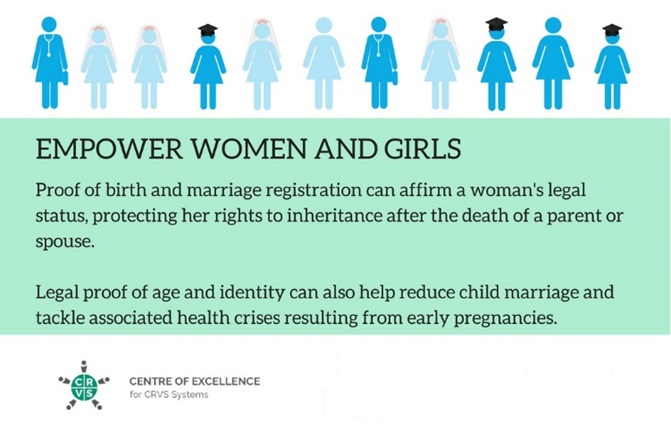On February 26th, the Centre of Excellence for Civil Registration and Vital Statistics (CRVS) Systems at the International Development Research Centre (IDRC) and its partners hosted a high-level panel and technical consultation sessions on gender and CRVS -- Making the Invisible Visible: CRVS as a basis to meeting the 2030 Gender Agenda. The meeting was the first of its kind to focus solely on the gender dimensions of CRVS systems and the barriers women and girls face when registering vital life events.
Six months have passed since that meeting and, with hundreds descending on Dubai to discuss the role of data in achieving the Sustainable Development Goals, the United Nations World Data Forum presents a unique opportunity to reignite the conversations around CRVS and gender. The Centre of Excellence plans to take full advantage of the rare occasion where statisticians, civil registrars, gender experts, and policy-makers are all gathered under one roof.
CRVS systems are particularly beneficial to women and girls, as vital statistics provide sex-disaggregated demographic data on key issues such as population distribution and maternal mortality. Because civil registration is continuous and universal, these statistics are a powerful source of information on a sub-national level at a more frequent interval than population censuses. By providing proof of legal identity and social relationships, civil registration also makes it easier for women to access crucial services such as health, education, political representation, and to lay claim to inheritance and/or property rights.

The impacts of a well-functioning system are beyond that of only the individual; CRVS plays a key role in assisting countries to measure and to meet their SDGs: 24 of the SDG targets and 67 indicators can be measured effectively by using data derived from well-functioning CRVS systems. These systems are a must-have for generating the data countries need for the "Leave No One Behind" agenda.
However, women still face many financial, cultural, and legal barriers to realizing the benefits of CRVS, such as the cost of registration; requirements of a husband's presence for a child's registration; the system's failure to capture customary marriages; burial practices; and inheritance laws. More understanding is needed to overcome these barriers, specifically how to do so within a country's unique political and cultural context. Unfortunately, there is a dearth of strong case studies which explore the successes or failures of these interventions. As such, there remains a knowledge gap on proximate constraints and underlying factors that may influence the registration of different vital events for women and girls.
And while there has been a growing recognition over the last several years of the importance of strong CRVS systems, gendered barriers and inequalities are often overlooked. Burning questions around CRVS and gender remain:
- Examine barriers and hidden biases: What gender biases exist in the legal systems that govern civil registration? How do the current legal frameworks discourage or prohibit women from registering vital life events such as their child's birth or their own marriage? What are cultural, economic or social barriers may prevent women and girls from registering their vital events?
- Uncover the gaps: Where are the registration data gaps? Where are women least likely to be counted, registered or recognized? How can we increase demand for registration among these vulnerable populations? How can we better engage men to ensure that vital events pertaining to their daughters and wives are legally recorded?
- Develop a strategy: How should countries register different types of marriages, especially those that are least likely to be registered or recognized? How can we develop evidence based strategies or design programs that facilitate registration of vital events for women and girls?
- Build capacity, share knowledge and increase data use and impact: How can countries strengthen their technical and administrative capacities? On the local level, how can registration authorities more efficiently register marriage and divorces? How can we increase data use and promote evidenced-based policy making?
Striving to answer the questions above, the Centre of Excellence for CRVS Systems has set out to inspire a global commitment to integrate gender issues in CRVS systems by continuing to discuss the status of the field, evaluating opportunities and challenges, as well as identifying priority areas of research and action to strengthen CRVS systems. We are looking forward to participating in several sessions on the topic in Dubai -- specifically "A new era for Civil Registration and Vital Statistics systems: innovation and transformation to develop capacities, reduce gender inequities, and improve data for the SDGs" on Wednesday October 24th.
Alongside our partners Open Data Watch, we will also be launching a Compendium of Knowledge Briefs on Gender and Civil Registration and Vital Statistics Systems. The purpose of the knowledge briefs is to share and promote research and policy papers in gender and CRVS, and to synthesize, publish and socialize key messages, innovative case examples and emerging findings. The knowledge briefs will serve to promote the adoption of good practices by keeping the dialogue on the importance of CRVS systems for the global gender agenda ongoing.
The Centre of Excellence is working to connect and convene relevant stakeholders to ensure that CRVS systems count, work for and empower women and girls everywhere. The World Data Forum in Dubai is the perfect platform to do just that.

